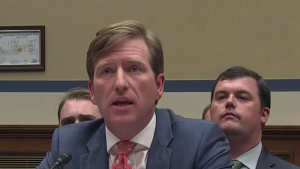While the 2020 election cycle has been officially underway for less than a month, there have already been significant technology concerns. While the most notable tech concern was the Feb. 3 Iowa Caucus, researchers at the Massachusetts Institute of Technology (MIT) raised additional concerns in a report published Feb. 13.
The House Homeland Security Committee advanced the State and Local Cybersecurity Improvement Act out of committee on Feb. 12.
The Cybersecurity and Infrastructure Security Agency (CISA) issued a statement today offering assurance that efforts by the Federal government and state and local authorities have resulted in installation of intrusion detection sensors on election infrastructure in all 50 states.
During today’s Senate Homeland Security Committee Hearing, both Committee Chairman Ron Johnson, R-Wis., and Cybersecurity and Infrastructure Security Agency (CISA) Director Chris Krebs agreed that CISA’s role is largely similar to the Federal Emergency Management Agency’s mandate.
The 2020 election cycle got off to a rocky start with the Feb. 3 Iowa Caucus plagued with technical trouble, and a Feb. 3 report from McAfee only doubles down on election technology concerns.
An apparent series of interconnected failures surrounding the use of a key vote-tallying phone app – plus delays associated with a phone-reporting backup system – derailed the reporting of the Iowa Democratic Caucus results last night, even as more states and localities are preparing to add app technologies to some aspects of their election processes.
With today’s Iowa Caucus, the long slog to the 2020 Election is officially underway. In preparation for the General Election this November, West Virginia will become the first state to allow people with disabilities to vote with their smartphones.
California Secretary of State Alex Padilla announced Jan. 24 that he had “conditionally” certified Los Angeles County’s new publicly-owned voting system.
Cybersecurity and Infrastructure Security Agency (CISA) Director Chris Krebs told the nation’s mayors this week that Federal government needs to ensure that state and local governments have the resources needed to combat growing cybersecurity concerns, and said that heightened security threats from Iran and elsewhere may help provide governments with the leverage to get that done.
The National Association of State Chief Information Officers (NACSIO) today released its 2020 Federal advocacy priorities and zeroed in on the importance of cybersecurity.










